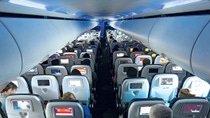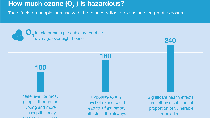Maintaining a healthy flight environment
Ozone exposure can lead to discomfort and adverse health effects in airplane passengers and crew. Removing it from the cabin air makes air travel more comfortable.

You cannot see ozone, but even small quantities can be hazardous to your health. Atmospheric ozone is caused by the photochemical conversion of oxygen by solar ultraviolet radiation. Ozone levels vary with season, altitude, latitude and weather systems. On the ground, ozone concentrations as low as 120 micrograms per cubic meter can be the cause of upper respiratory symptoms, dry eyes and headaches. At altitudes where commercial airplanes regularly cruise, ozone reaches significantly higher concentrations. When this enters the aircraft through air conditioning ducts, passengers and crew can feel quite uncomfortable.

For over 30 years, BASF has supplied Deoxo® ozone converters to airlines and aircraft manufacturers to help combat air pollutants within the aircraft. The Deoxo converter removes ozone from the cabin air by catalytically converting it into oxygen. In addition, BASF offers Deoxo ozone/VOC converter technology, which reduces unpleasant smells that are generally associated with Volatile Organic Compounds (VOC) generated by aircraft engine exhaust, thus making for a safer and pleasant aircraft cabin flight experience.
